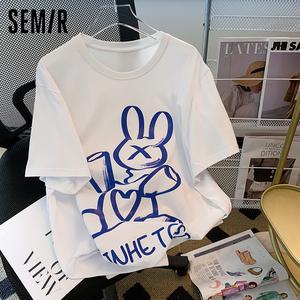T-shirt fabrics can be classified according to different fiber materials, processes and characteristics. The following are several common T-shirt fabric classifications and their characteristics:
1. Cotton fabric: Cotton is one of the most commonly used T-shirt fabrics. It has good breathability, comfort and moisture absorption, allowing the skin to stay dry. Cotton is soft and manageable, making it easy to wash and care for. However, cotton fabrics can have problems with shrinkage and wrinkles.
2. Polyester fabric: Polyester (polyester fiber) is a synthetic fiber often used to make sports T-shirts. Polyester fabric has high strength, wear resistance and wrinkle resistance, and is not easy to deform and fade. It has good quick-drying and antibacterial properties and is suitable for high-intensity sports and outdoor activities.
3. Nylon fabric: Nylon is a synthetic fiber often used to make sports T-shirts. Nylon fabrics are lightweight, resistant to friction and abrasion, and offer excellent strength and durability. At the same time, nylon fabric also has good waterproof performance and is suitable for outdoor sports and humid environments.
4. Acrylic fiber fabric: Acrylic fiber has warm and soft properties and is usually used to make winter T-shirts. It has good thermal insulation properties, is elastic and wrinkle-resistant, and can also quickly wick away moisture. However, acrylic fibers pill relatively easily and require careful care.
5. Wool fabric: Wool is a natural fiber that is usually used to make warm T-shirts. Wool fabric has excellent warmth retention, good moisture permeability and antibacterial properties. It regulates body temperature and has good hygroscopicity, keeping skin dry. However, it should be noted that wool fabrics may cause allergies in some people.
The above are only common classifications of T-shirt fabrics. Each fabric has its own unique characteristics and applicable scenarios. When choosing T-shirt fabrics, you can comprehensively consider factors such as climate conditions, usage scenarios, warmth requirements, comfort requirements, etc., and choose the fabric that best suits you.







